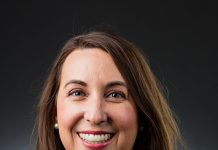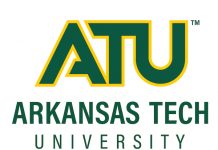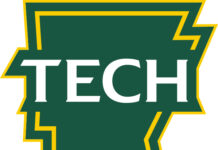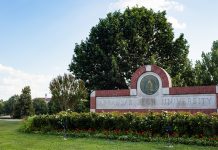An international exchange of ideas is allowing professors from Arkansas Tech University to partner with visiting scholars from Turkey and pursue personalized approaches to teaching and learning in higher education.
The collaborative project was sparked by a visit to Ankara University by ATU College of Education faculty members Dr. Rebecca Callaway, professor of curriculum and instruction, and Dr. Mohamed Ibrahim, associate professor of curriculum and instruction.
While they were in Turkey, they discussed international exchange programs and collaboration with Turkish professors and administrators.
A few months later, the husband and wife duo of Dr. Ismail Guven (photographed, right) and Dr. Yasemine Gulbahar (photographed, left), educational scientists from Ankara University, was on an airplane to America for a year-long educational and cultural adventure in Russellville, Ark.
“When we decided to get our sabbatical, it was the first thing in our mind to contact (ATU),” said Gulbahar.
Dr. Linda Bean, dean of the ATU College of Education, was on board from the word go.
“I think first is the international connection with a place that we never would have thought we had a connection with before,” said Bean. “Just to know the difference in the size between their university and our university is mind boggling. It enhances our department and helps us to be better to bring in a new knowledge base. We want them to learn from us, but we also want to learn from them and for this to be the best year of their life. They feel like family. They feel like one of us.”
ATU is the third-largest university in Arkansas with more than 12,000 students on campuses in Russellville and Ozark. By comparison, Ankara University has 70,000 students spread out over five main campuses. Guven and Gulbahar reside in the Turkish capital of Ankara, which is home to 4 million residents.
Guven indicated the feelings of family are reciprocal.
“All of the people here feel equal,” said Guven. “That’s the very important thing. You can just sense it. In Turkey, sometimes, we don’t feel that.”
Topics the research project seeks to address include how students learn, how learning can be improved, how can students become high achievers and the role of reinforcement learning.
“The main idea of the project is to improve learning for higher education students,” said Gulbahar. “We want to use learning analytics to develop personalized, adaptive teaching.”
Callaway explained that efficiency and addressing the direct needs of individual students are among the anticipated outcomes of the analytical approach to teaching and learning.
“The whole idea of the project is, through analytics, to set it up such that it doesn’t matter what subject is being taught…we can put the content in and it will adjust to what the learner already knows,” said Callaway. “Then, we can progress to the next level or target what the student is deficient in rather than a reboot of the same thing over and over again. As a result, we’ll know what level they are learning on, what they need to progress to the next level and if they already know the content, allow them to skip forward to the next material. We are hoping to set it up such that it won’t matter if it is math, science, English, computer science, logic, history or any other subject. It’s a matter of how the machine handles the input from the student.”
Since arriving in July with their 11-year old daughter, Verda, the Turkish scholars have visited history, computer science, business and education classrooms at ATU.
The family has made a road trip to Crystal Bridges Museum of American Art in Bentonville and paid a visit to friends in Alabama. They attended their first American football game on Saturday, Sept. 22, when Arkansas Tech defeated Southern Nazarene University 24-10 at Thone Stadium at Buerkle Field in Russellville.
Guven and Gulbahar said other memorable experiences have included visiting the Pope County Fair and surviving a driving tour of the Conway roundabouts.
“In some ways it was easy, and in some ways it was difficult,” said Guven when asked about the transition to Arkansas. “The big difference is the lack of public transportation. The way of life is very different. People are nice and they don’t give any harm to anyone, but they are not as social as in Turkey. That might be normal for this culture. We’ve been very happy with the attitudes of the public schools here. The people at Russellville Middle School have been very nice to our daughter and they are very helpful to us in terms of recommendations and guidance.”
Verda enrolled at RMS for the 2018-19 academic year.
“She didn’t face any problems,” said Gulbahar. “She adapted quickly. We feel at peace here.”
The visiting scholars mentioned the willingness of faculty members across different disciplines to work together as one strength of their work environment at ATU.
“Most of the things are similar,” said Gulbahar. “Technology and infrastructure is better, of course, I want to mention it. Students are, somehow, different. They are more relaxed here…not as anxious as the Turkish students. Your system is really well structured and settled. We are still, sometimes, having problems with computer software (in Turkey).”
Guven, Gulbahar and their daughter will remain in Russellville until July 2019, at which time they will return to Turkey and carry with them a collection of memories and innovative ideas back to Ankara University.
“The hospitality of the people and their open-mindedness encouraged us very deeply,” said Guven. “We feel here as if we are a part of a big family. Russellville provides us with close relationships with other people. We knew other states and other people, but we preferred to come here.”





